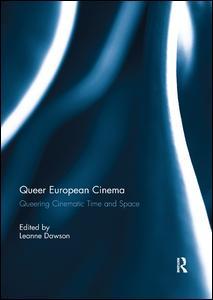Description
Queer European Cinema
Queering Cinematic Time and Space
Coordinator: Dawson Leanne
Language: English
Subjects for Queer European Cinema:
Keywords
Road Movies; LGB; Studies in European Cinema; Young Man; Queer European cinema; LGBTQ Film; Cinema history; Queer Temporality; LGB Subject; nation; Cis Men; politics; Queer Cinema; LGBTQ politics; Lesbian Pornography; Sanja Laćan; European Road Movies; Elena Boschi; White Trash; Ingrid Ryberg; Italian Film Studies; Michael Gott; LGB Right; Thibaut Schilt; Elective Family; Mobile Phone Camera; Queer Identities; LGB Sexuality; Queer Characters; Swedish Film Institute; Grand Theft Auto; Non-dominant Identities; LGBT Representation; Real Lesbian; Falls City; Lesbian Visibility
Publication date: 02-2019
· 17.4x24.6 cm · Paperback
Publication date: 08-2017
· 17.4x24.6 cm · Hardback
Description
/li>Contents
/li>Readership
/li>Biography
/li>
Queer European Cinema commences with an overview of LGBTQ representation throughout cinematic history, interwoven with socio-political reality in Europe and beyond, to consider trends including the boarding school film, the gay road movie, and queer horror such as the lesbian vampire tale, before analysing case studies from the ?low culture? of pornography to the ?high culture? of arthouse cinema.
This collection of essays explores borders and boundaries of geography, temporality, ethnicity, class, gender, sexuality, and desire in a range of European films at a time when both LGBTQ politics and the concept of Europe are under intense scrutiny in representation and reality, to demonstrate how LGBTQ film can serve as a political tool to create visibility and acceptance as well as providing entertainment.
Chapters include an analysis of both trans and femme identities in Academy Award-winning Boys Don?t Cry alongside German film, Unveiled; the intersection of lesbian visibility and the notion of nation on the Croatian screen at its point of entry into the European Union and during the gay marriage referendum; music and its relation to camp in Italian transnational cinema; European lesbian feminist pornography; and an analysis of liminal spaces and citizenship in queer French-language road movies. This book was originally published as a special issue of Studies in European Cinema.
Introduction: Queer European Cinema: Queering Cinematic Time and Space 1. Passing and Policing: Controlling Compassion, Bodies and Boundaries in Boys Don’t Cry and Unveiled/Fremde Haut 2. Concealing, Revealing, and Coming Out: Lesbian Visibility in Dalibor Matanić’s Fine Dead Girls and Dana Budisavljević’s Family Meals 3. Loose Cannons Unloaded: Popular Music, Space, and Queer Identities in the Films of Ferzan Özpetek 4. The Ethics of Shared Embodiment in Queer, Feminist and Lesbian Pornography5. Crossing Borders and Queering Identities in French-Language European Road Cinema
Dr. Leanne Dawson is a Lecturer in German and Film Studies at the University of Edinburgh and Chair of the Scottish Queer International Film Festival. Her research focuses on LGBTQ representation in film, literature, theatre, performance art, and archives. Her publications include Queering German Culture (Camden House, 2017), Queering European Film Festivals (Taylor & Francis, 2017), and The Other: Gender, Sexuality and Ethnicity in European Cinema and Beyond (Taylor & Francis, 2014). She employs her academic research to create, promote and support queer culture beyond the academy: she has worked as a consultant for theatre; curated and introduced film seasons for cinemas; spoken about LGBTQ matters on the BBC; and is making a documentary, Femmes on Film about femme representation and socio-political reality.




